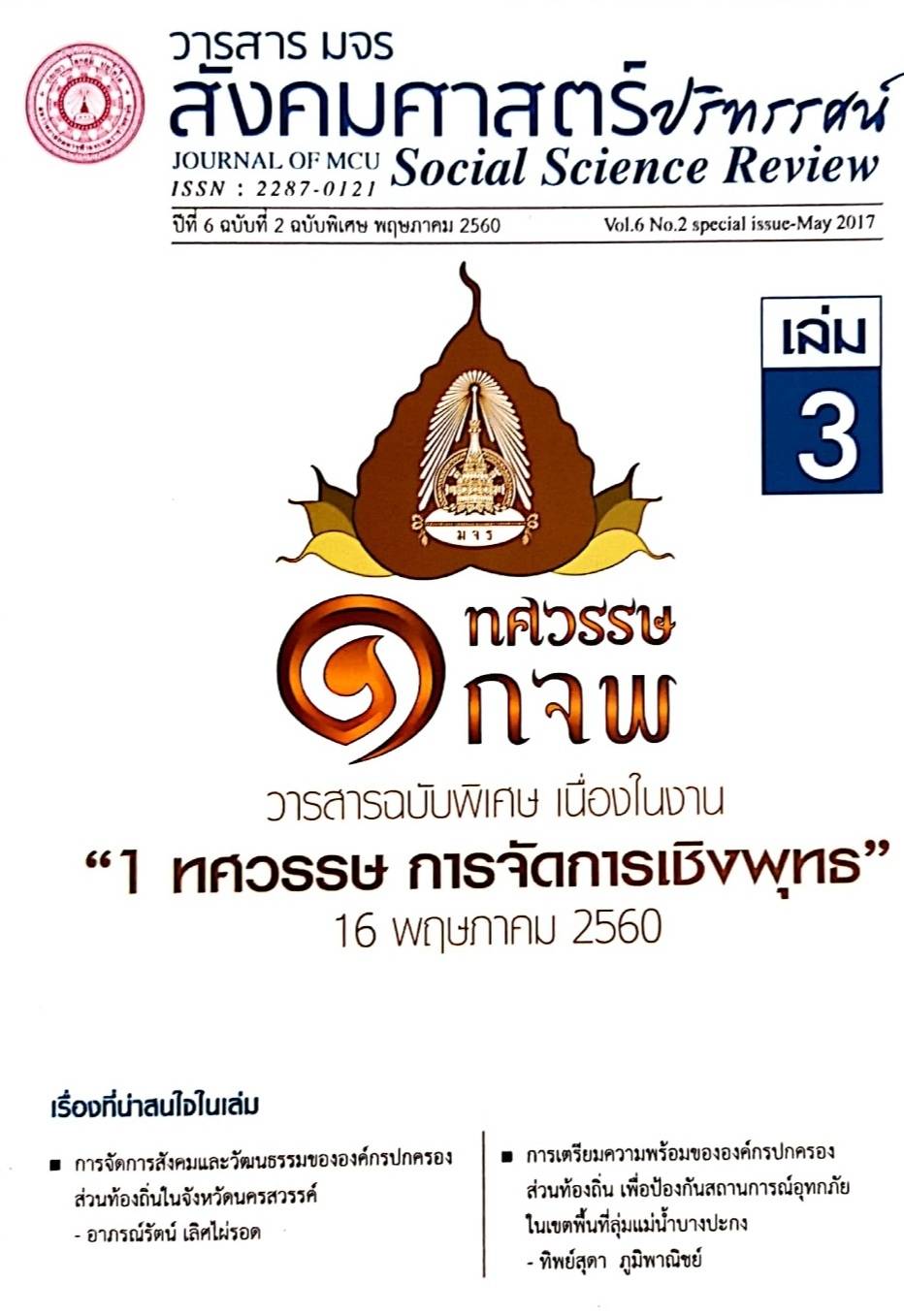การพัฒนารูปแบบตัวบ่งชี้ภาวะผู้นำทางวิชาการสำหรับผู้บริหารโรงเรียนขนาดเล็ก
บทคัดย่อ
การวิจัยครั้งนี้มีวัตถุประสงค์ เพื่อศึกษาการพัฒนาตัวบ่งชี้ภาวะผู้นำทางวิชาการ สร้างรูปแบบการพัฒนาตัวบ่งชี้ภาวะผู้นำทางวิชาการ และประเมินรูปแบบการพัฒนาตัวบ่งชี้ภาวะผู้นำทางวิชาการสำหรับผู้บริหารโรงเรียนขนาดเล็ก การดำเนินการวิจัยแบ่งออกเป็น 3 ขั้นตอน คือ ศึกษาเอกสาร ทฤษฎี และสัมภาษณ์ผู้ทรงคุณวุฒิ 9 ท่าน พัฒนาตัวบ่งชี้ภาวะผู้นำทางวิชาการสำหรับผู้บริหารโรงเรียนขนาดเล็ก โดยนำแบบสอบถามไปใช้กับกลุ่มตัวอย่าง ได้แก่ โรงเรียนขนาดเล็ก ทุกภูมิภาค จำนวน 190 โรงเรียน 380 คน วิธีการสุ่มแบบแบ่งประเภทและกำหนดขนาดกลุ่มตัวอย่างโดยใช้ตารางของเครจซี่และมอร์แกน เครื่องมือที่ใช้ในการวิจัยเป็นแบบสอบถามแบบมาตราส่วนประมาณค่า 5 ระดับ มีค่าความเชื่อมั่น เท่ากับ 0.868 สถิติที่ใช้ในการวิเคราะห์ข้อมูล คือ ร้อยละ ค่าเฉลี่ย ค่าส่วนเบี่ยงเบนมาตรฐาน และประเมินรูปแบบการพัฒนาตัวบ่งชี้ภาวะผู้นำทางวิชาการสำหรับผู้บริหารโรงเรียนขนาดเล็ก โดยใช้การสัมมนาอิงผู้เชี่ยวชาญ จำนวน 9 คน
ผลการวิจัยพบว่ารูปแบบการพัฒนาตัวบ่งชี้ภาวะผู้นำทางวิชาการสำหรับผู้บริหารโรงเรียนขนาดเล็ก ประกอบด้วย 5 ด้าน คือ ด้านการกำหนดทิศทางและนโยบาย มี 3 ตัวบ่งชี้ ด้านการจัดการบริหารหลักสูตรและการเรียนรู้ มี 3 ตัวบ่งชี้ ด้านการสร้างบรรยากาศการเรียนรู้ มี 3 ตัวบ่งชี้ ด้านการพัฒนาวิชาชีพครู มี 3 ตัวบ่งชี้ และด้านการส่งเสริมคุณภาพนักเรียน 3 ตัวบ่งชี้
เอกสารอ้างอิง
พนัส ด้วงเอก. (2555). การบริหารงานวิชาการของผู้บริหารสถานศึกษา สังกัดสำนักงานเขตพื้นที่การศึกษาประถมศึกษาบุรีรัมย์ เขต 1. วิทยานิพนธ์ ครุศาสตรมหาบัณฑิต สาขาวิชาการบริหารการศึกษา มหาวิทยาลัยราชภัฏบุรีรัมย์.
สำนักงานคณะกรรมการการศึกษาขั้นพื้นฐาน. (2553). แผนการจัดการเรียนรู้แบบคละ ชั้น ป.4 - 5 ตามหลักสูตรแกนกลางการศึกษาขั้นพื้นฐาน 2551. กรุงเทพฯ: ผู้แต่ง.
สำนักงานคณะกรรมการพัฒนาระบบราชการ. (2551). โครงการสร้างต้นแบบการปรับเปลี่ยนกระบวนทัศน์ วัฒนธรรมและค่านิยม (I AM READY: ฉันพร้อมทำเพื่อประชาชน). สำนักวิชาการและมาตรฐานการศึกษา สำนักงานคณะกรรมการการศึกษาขั้นพื้นฐาน.
สำนักงานรับรองมาตรฐานและประเมินคุณภาพการศึกษา (องค์การมหาชน). (2548). การสังเคราะห์ข้อมูลผลการประเมินรอบแรก (2544 - 2548) ระดับการศึกษาขั้นพื้นฐาน. ค้นเมื่อวันที่ 20 มกราคม 2556, จาก http://www.onesqa.or.th
สํานักงานเลขาธิการสภาการศึกษา. (2552). ข้อเสนอการปฏิรูปการศึกษาในทศวรรษที่สอง (พ.ศ. 2552-2561). กรุงเทพฯ : พริกหวานกราฟฟิค.
_________. (2553). การบรรยายทางวิชาการเพื่อสร้างความตระหนักเรื่องการก้าวสู่ประชาคมอาเซียน. กรุงเทพฯ: พิมพ์ดีการพิมพ์.
สำนักบริหารงานการศึกษานอกโรงเรียน. (2550). สถิติข้อมูลการศึกษาท้องถิ่น. กรุงเทพฯ: ผู้แต่ง
สุเทพ พงศ์ศรีวัฒน์. (2553). ภาวะผู้นำ: ทฤษฎีและการปฏิบัติ. เชียงราย: มหาวิทยาลัย ราชภัฏเชียงราย.
Bossert, A. (1988). Leadership in organization. New Jersey: Prentice Hall.
Cooper, R. K. & Sawaf, A. (1997). Executive EQ intelligence in leadership and organization. New York: Grossest & Putnam.
Dimmock, & Walker, (2005). Educational Leadership. Culture and Diversity. London: Sage Publica tions.
Krug, R. E. (1992). Leadership and performance beyond expectations. New York: Free Press.
Lambert, V. A., Lambert, C. E. & Ito, M. (2003). Workplace stressors,ways of coping and demographic characteristics as predictors of physical and mental health of Japanese hospital nurses. International Journal of Nursing Studies, 41(4),85 - 97.
Leithwood, K., & Jantzi, D. (2006). Transformational school leadership: Its effects on students, teachers and their classroom practices. School Effectiveness and School Improvement, 17(2), 201-227.
McEwan, E. K. (1998). Seven Steps to Effective Instructional Leadership. California: CorwinPress.
McNeill, D. (2003). The acquisition of language. New Jersey: Harper and Row.
New Zealand's Offical Statistics Agency. (2008) a New Zealand in Profile 2008.
Pendleton county. (2007). Pendleton county schools job description. Retrieved from http://72.14.235.104/search?q=cache:YJk3kUc2OJ0J
Stogdill, R. M. (1974). Handbook of Leadership: A survey of theory and research. New York: Free Press.
ดาวน์โหลด
เผยแพร่แล้ว
รูปแบบการอ้างอิง
ฉบับ
ประเภทบทความ
สัญญาอนุญาต
ลิขสิทธิ์ (c) 2020 วารสาร มจร สังคมศาสตร์ปริทรรศน์

อนุญาตภายใต้เงื่อนไข Creative Commons Attribution-NonCommercial-NoDerivatives 4.0 International License.
เพื่อให้เป็นไปตามกฎหมายลิขสิทธิ์ ผู้นิพนธ์ทุกท่านต้องลงลายมือชื่อในแบบฟอร์มใบมอบลิขสิทธิ์บทความให้แก่วารสารฯ พร้อมกับบทความต้นฉบับที่ได้แก้ไขครั้งสุดท้าย นอกจากนี้ ผู้นิพนธ์ทุกท่านต้องยืนยันว่าบทความต้นฉบับที่ส่งมาตีพิมพ์นั้น ได้ส่งมาตีพิมพ์เฉพาะในวารสาร มจร สังคมศาสตร์ปริทรรศน์ เพียงแห่งเดียวเท่านั้น หากมีการใช้ภาพหรือตารางหรือเนื้อหาอื่นๆ ของผู้นิพนธ์อื่นที่ปรากฏในสิ่งตีพิมพ์อื่นมาแล้ว ผู้นิพนธ์ต้องขออนุญาตเจ้าของลิขสิทธิ์ก่อน พร้อมทั้งแสดงหนังสือที่ได้รับการยินยอมต่อบรรณาธิการ ก่อนที่บทความจะได้รับการตีพิมพ์ หากไม่เป็นไปตามข้อกำหนดเบื้องต้น ทางวารสารจะถอดบทความของท่านออกโดยไม่มีข้อยกเว้นใดๆ ทั้งสิ้น





